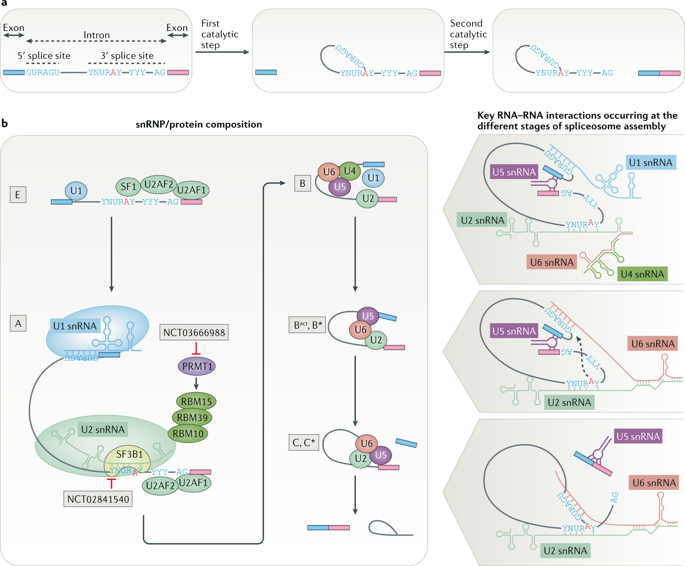当前位置:
X-MOL 学术
›
Nat. Rev. Clin. Oncol.
›
论文详情
Our official English website, www.x-mol.net, welcomes your
feedback! (Note: you will need to create a separate account there.)
Roles and mechanisms of alternative splicing in cancer - implications for care.
Nature Reviews Clinical Oncology ( IF 81.1 ) Pub Date : 2020-04-17 , DOI: 10.1038/s41571-020-0350-x Sophie C Bonnal 1, 2 , Irene López-Oreja 1, 2, 3 , Juan Valcárcel 1, 2, 4
Nature Reviews Clinical Oncology ( IF 81.1 ) Pub Date : 2020-04-17 , DOI: 10.1038/s41571-020-0350-x Sophie C Bonnal 1, 2 , Irene López-Oreja 1, 2, 3 , Juan Valcárcel 1, 2, 4
Affiliation

|
Removal of introns from messenger RNA precursors (pre-mRNA splicing) is an essential step for the expression of most eukaryotic genes. Alternative splicing enables the regulated generation of multiple mRNA and protein products from a single gene. Cancer cells have general as well as cancer type-specific and subtype-specific alterations in the splicing process that can have prognostic value and contribute to every hallmark of cancer progression, including cancer immune responses. These splicing alterations are often linked to the occurrence of cancer driver mutations in genes encoding either core components or regulators of the splicing machinery. Of therapeutic relevance, the transcriptomic landscape of cancer cells makes them particularly vulnerable to pharmacological inhibition of splicing. Small-molecule splicing modulators are currently in clinical trials and, in addition to splice site-switching antisense oligonucleotides, offer the promise of novel and personalized approaches to cancer treatment.
中文翻译:

选择性剪接在癌症中的作用和机制-对护理的意义。
从信使RNA前体中去除内含子(pre-mRNA剪接)是表达大多数真核基因必不可少的步骤。选择性剪接能够从一个基因调节多种mRNA和蛋白质产物的产生。癌细胞在剪接过程中具有一般性以及癌症类型特异性和亚型特异性改变,这些改变可能具有预后价值,并有助于癌症进展的每个标志,包括癌症免疫反应。这些剪接改变通常与编码剪接机制的核心成分或调节子的基因中癌症驱动子突变的发生有关。具有治疗意义的是,癌细胞的转录组情况使其特别容易受到剪接的药理抑制作用。
更新日期:2020-04-24
中文翻译:

选择性剪接在癌症中的作用和机制-对护理的意义。
从信使RNA前体中去除内含子(pre-mRNA剪接)是表达大多数真核基因必不可少的步骤。选择性剪接能够从一个基因调节多种mRNA和蛋白质产物的产生。癌细胞在剪接过程中具有一般性以及癌症类型特异性和亚型特异性改变,这些改变可能具有预后价值,并有助于癌症进展的每个标志,包括癌症免疫反应。这些剪接改变通常与编码剪接机制的核心成分或调节子的基因中癌症驱动子突变的发生有关。具有治疗意义的是,癌细胞的转录组情况使其特别容易受到剪接的药理抑制作用。































 京公网安备 11010802027423号
京公网安备 11010802027423号